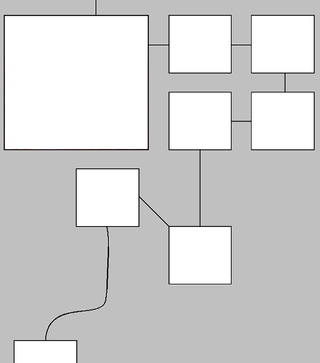
Jeffrey Paul "Jeph" Jacques is an American cartoonist who writes and draws the webcomics Questionable Content, Alice Grove, and DORD.

The infinite canvas is the feeling of available space for a webcomic on the World Wide Web relative to paper. The term was introduced by Scott McCloud in his 2000 book Reinventing Comics, which supposes a web page can grow as large as needed. This infinite canvas gives infinite storytelling features and creators more freedom in how they present their artwork.

Jeffrey J. Rowland is the author and artist responsible for Wigu and Overcompensating, two popular webcomics. Originally from Locust Grove, Oklahoma, Rowland now lives in Easthampton, Massachusetts, where he continues to work on the two projects, while running TopatoCo, a company which sells merchandise based on his and other artists' comics.
The following is a list of players, past and present, who have appeared in at least one competitive game for the Boston Red Sox American League franchise, known previously as the Boston Americans (1901–07).
The following is a list of players, both past and current, who appeared at least in one game for the Miami Marlins franchise, known as the Florida Marlins from their inception in 1993 through the 2011 season.
The following is a list of players, both past and current, who appeared at least in one game for the Washington Nationals National League franchise (2005–present), also known previously as the Montreal Expos (1969–2004).
The following is a list of players, both past and current, who appeared in at least one game for the Tampa Bay Rays franchise, formerly known as the Devil Rays.
The following is a list of players, both past and current, who appeared at least in one game for the Pittsburgh Pirates National League franchise (1891–present), previously known as the Pittsburgh Alleghenys (1882–1890).
White Ninja is an animated webseries created by Scott Bevan and Kent Earle from Saskatoon, Saskatchewan, Canada. It was previously a webcomic that ran from 2002 to 2012 as part of the National Lampoon Humor Network. The comic was also part of Dayfree Press and ran exclusive strips on Cracked.com between August 2008 and April 2009. The comics were rebooted as a webseries, launched in 2015.
The following is a list of players, both past and current, who appeared at least in one game for the Cincinnati Reds National League franchise, also known previously as the Cincinnati Red Stockings (1882–1889) and Cincinnati Redlegs (1953–1958). Players in Bold are members of the National Baseball Hall of Fame.

Chris Burnham is a comic book artist known for his work on Batman Incorporated with Grant Morrison, as well as the creator-owned books such as Officer Downe and Nixon's Pals, which were published by Image Comics.

ShiftyLook was a subsidiary of Bandai Namco Holdings that was focused on revitalizing older Namco franchises, with their first step being video game webcomics based on the company's various franchises. The subsidiary later offered webtoons, anime, playable games, music, message boards, and graphic novels as well. ShiftyLook regularly held substantial exhibitions at large US comics conventions, having a major booth presences and holding large giveaways of promotional merchandise.
The history of webcomics follows the advances of technology, art, and business of comics on the Internet. The first comics were shared through the Internet in the mid-1980s. Some early webcomics were derivatives from print comics, but when the World Wide Web became widely popular in the mid-1990s, more people started creating comics exclusively for this medium. By the year 2000, various webcomic creators were financially successful and webcomics became more artistically recognized.
Notable events of 2002 in webcomics.
Notable events of 2005 in webcomics.
The business of webcomics involves creators earning a living through their webcomic, often using a variety of revenue channels. Those channels may include selling merchandise such as t-shirts, jackets, sweatpants, hats, pins, stickers, and toys, based on their work. Some also choose to sell print versions or compilations of their webcomics. Many webcomic creators make use of online advertisements on their websites, and possibly even product placement deals with larger companies. Crowdfunding through websites such as Kickstarter and Patreon are also popular choices for sources of potential income.
This page is based on this
Wikipedia article Text is available under the
CC BY-SA 4.0 license; additional terms may apply.
Images, videos and audio are available under their respective licenses.




